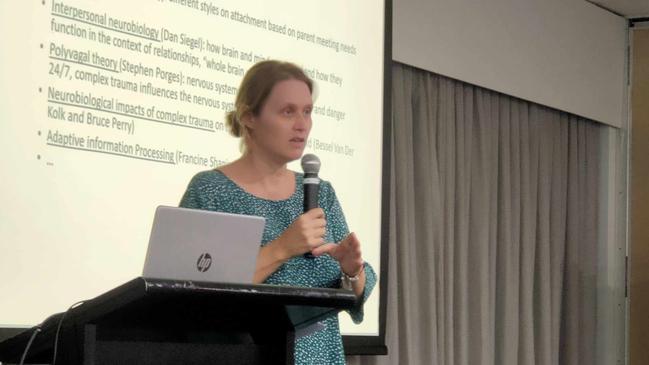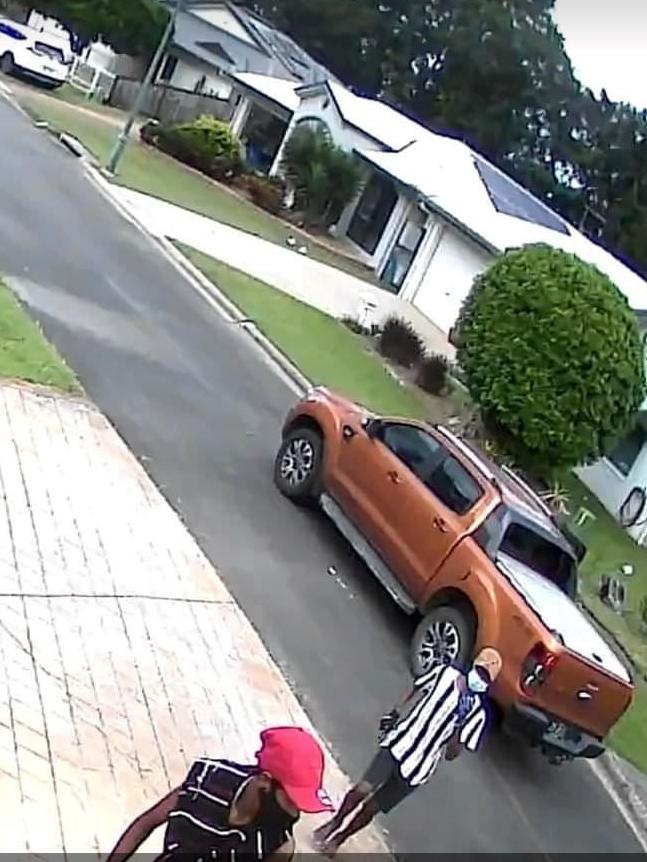Trauma expert reveals challenge of PTSD treatment
This is how a Cairns team is turning around trauma suffered by the region’s most disturbed youth, through the treatment of complex PTSD symptoms impacting abused and neglected resi care kids.
Cairns
Don't miss out on the headlines from Cairns. Followed categories will be added to My News.
How highly trained staff are turning around trauma suffered by the region’s most disturbed youth, through treatment of complex PTSD symptoms impacting abused and neglected young people living in resi care, has been explored at the first ever Far North psychology conference.
Funded through the Department of Child Safety, Evolve Therapeutic Services primarily treats abused kids living in residential care and foster homes.
Survivors of physical, sexual abuse, witness to domestic violence, neglected, abandoned and often suffering foetal alcohol syndrome disorder, or language and intellectual impairment, Evolve treats young people impacted by the complex trauma inflicted by primary caregivers.

Evolve’s child and adolescent psychiatrist Dr Annelies Lamote described the diagnosis and treatment of these children like a “tsunami coming to you”.
“These children have so many problems, they have so many symptoms, there’s so much work to do, and we don’t actually have integrated treatments for these kids,” she said.
“How do I make a treatment plan for these children? Because their lives keep going, things keep happening to these children, traumas keep happening to these children, they sometimes go from carer to carer.

“We are often witness of this rupture after rupture after rupture. So how do you treat these children? It’s messy, it’s confusing.”
Ms Lamote said underpinning any positive change for her clients was creating a safe environment and attachment therapy.
But a revolving door of inexperienced and often burnt out youth workers presented the single biggest challenge for the Evolve team.
“A big issue we have with kids in residential care is they do not have a primary caregiver,” she said.
“They don't have a consistent primary caregiver, they have youth workers, which are often very, very good and they get along well with the children, and then youth worker leaves … so it’s another rupture, so then you get broken trust.”

Many children receiving treatment at Evolve have an IQ of around 70 which is significantly below average and borders on intellectual impairment.
Omission of complex PTSD from the fifth edition of the Diagnostic and Statistical Manual of Mental Illnesses was also a barrier to the work of Evolve due to the condition not being studied and well understood.
Regulating uncomfortable feelings by disassociation, self-harm, highly sexualised, compulsive and repetitive behaviour, often in conjunction with drug use, children are referred to Evolve by the Department of Child Safety and are assessed.
“The more difficult they are, the more likely we are to treat them,” she said.
“All the kids have that feeling of helplessness, hopelessness, defectiveness, shame, and embarrassment.”

And, as to why kids were running around at night in groups risking death in stolen cars, Ms Lamote said the high risk behaviour was a way to actually feel something.
“They’re very numb because they’re disconnected … this is the only time that they feel connected to themselves and to each other, according to speciality research,” she said.
“But then what? They need to be treated and these are the hardest group to get into treatment.”


Ms Lamote with Evolve co-workers, cynical psychologist Fiona Leo and psychologist Georgia Dobson for the first time joined other mental health professionals to take part in the Showcasing Psychology in FNQ event.
The event focused on sharing knowledge about mental health treatment of First Nation’s people and vulnerable youth and was held at the Benson Hotel.
More Coverage
Originally published as Trauma expert reveals challenge of PTSD treatment





